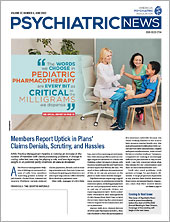A nonphysician colleague reached out to me in frustration. She had tried in vain to find a psychiatrist in private practice for her 17-year-old son. When she finally found one, she was immediately informed that the practice did not take private insurance, Medicare, or Medicaid. Further, the initial assessment would last two hours—one hour to meet with her son and another hour to meet with her and her husband. With each intake session costing $500, they would have to spend $1,000 for an initial evaluation, compared with a total copay of $80 had the practice accepted private insurance. Then there were additional costs for follow-up visits, which were recommended weekly at the start. When psychological testing was recommended and they were informed it would cost upward of $3,000, they were aghast, but what choice did they have? That they had great insurance was irrelevant; thankfully, the parents could afford it.
In this couple’s experience, many psychiatrists did not take insurance, Medicare, or Medicaid. Likewise, insurance did not cover psychological testing. She wondered how less financially stable individuals are able to obtain outpatient psychiatric care. Is access to these services reserved for middle-upper class U.S. citizens?
This is a serious matter as millions of U.S. adults (52.9 million in 2020, or 1 in 5 adults) experience mental illness a year. This number did not account for many more individuals dealing with the emotional burden of COVID-19 pandemic in the past two years. There are, of course, psychiatrists who accept third-party payments, but their numbers are small and their practices full. There are also community mental health agencies (government and private) from which individuals could receive excellent mental health care, but the volume of patients is such that access to a psychiatrist in these settings is often delayed, thereby increasing the risk of patients becoming more ill or worse. In addition to patients’ inability to see the psychiatrist of their choice and lack of privacy as afforded by a private psychiatrist’s office, there is also lack of flexibility of scheduling, leaving an employed patient scrambling and frantic. Most community mental health agencies do not have evening or early morning hours to accommodate working individuals.
In a national survey of office-based physicians by Tara F. Bishop, M.D., M.P.H., and colleagues reported in February 2014 in
JAMA Psychiatry, almost half of all psychiatrists did not accept private, noncapitated insurance, and more than half did not accept Medicare or Medicaid, numbers that were significantly lower than those of physicians of other specialties. Factors such as low reimbursement rates, the administrative burden of dealing with insurance companies, and the shortage of psychiatrists have been cited as reasons that psychiatrists do not accept insurance, the laws of supply and demand being firmly in their favor (see “
Members Report Uptick in Plans’ Claims Denials, Scrutiny, and Hassles” ). Notably, however, the authors of the
JAMA Psychiatry article observed that the rates of reimbursement for private practice psychiatrists’ services were the same as primary care physicians’, excluding psychotherapy services. That means, consistent with the Mental Health Parity and Addiction Equity Act and related laws, that if psychiatrists provided billable services equivalent to that of primary care physicians, they would be reimbursed at the same rate. It is not clear if the latter statement still holds true as anecdotal reports from some psychiatrists suggest it is variable.
Other encouraging news is the observation of the increased number of medical school graduates matching into psychiatric residency programs. In 2021, 6.5% of U.S. allopathic medical school graduates matched into psychiatry compared with 4.1% in 2011.Unfortunately, in the context of an aging workforce and retirements, the increase is unlikely to make a difference in the short term. These positive developments are also not likely to increase access to private practice psychiatrists for low socioeconomic patients. More is required of psychiatrists. Although low reimbursement rates by private insurance companies, coupled with significant administrative burdens impeding access to said reimbursements are real and must be challenged, Atul Gawande’s investigation of McAllen, Texas, reported in the New Yorker in 2009, suggests that the problem is not always with insurance companies or other third-party payers. It could sometimes stem from doctors’ practices, hence the need for organized medicine to always examine itself.
Increasing access to psychiatric care (including in private psychiatric offices) for the less financially fortunate among us is a spiritual, moral, and ethical imperative. A position statement by APA in 2017 declares, “The American Psychiatric Association believes that Health Care, inclusive of mental health care, is a human right.” Further, Section 9 of the Principles of Medical Ethics With Annotations Expecially Applicable to Psychiatry mandates physicians to support access to medical care for all people. Some private practitioners have responded by establishing a sliding scale for indigent patients, while some accept Medicare/Medicaid. Others work hard to ensure insurance companies reimburse their patients for out-of-pocket expenses. Still others have embedded some of their practice with primary care physicians or pediatricians.
Laudable as these measures are, they are still wholly inadequate. In complying with Section 7 of our ethics principles, psychiatrists are obliged to advocate for measures that will break down barriers to access to care. We must also challenge ourselves to explore and embrace innovations that would open our doors to all comers as we strive to meet our ethical obligation to support access to care for all regardless of their socioeconomic status. ■

